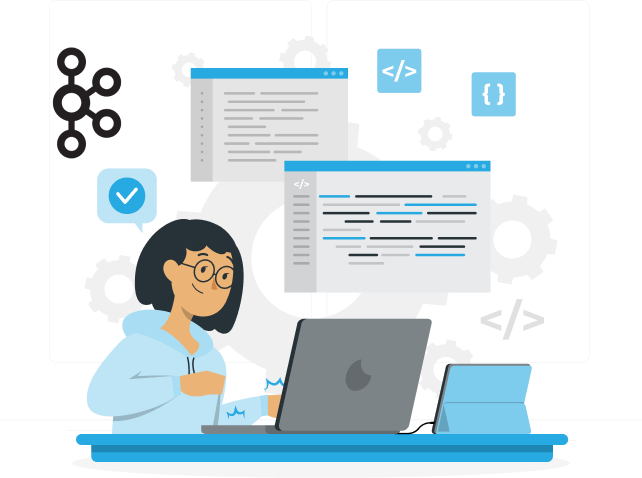Mobile applications are at the forefront of everyday life in today’s digital space, ranging from social media to banking to healthcare. This has led to a significant demand for skilled mobile developers.
To create an edge in this competitive field, developers need to build skills that differ from those in other domains. In this blog, we will examine the skills every mobile developer should develop.
Mobile Developers Skills: A Checklist
Let us explore the various skills which mobile developers should incorporate:
1. Knowledge of Programming Languages
At the core of mobile development are skills in programming languages tailored to specific platforms:
- Java: Traditionally the number one language for Android development, known for its reliability and extensive libraries.
- Kotlin: A modern alternative to Java, featuring concise syntax and improved safety, poised to gain popularity among Android developers.
- Swift: The primary choice for iOS development, known for excellent performance, enabling smoother and faster development.
- Objective-C: Still used for maintaining legacy iOS applications, though much less commonly now.
- Dart: Utilized with Flutter for efficient cross-platform application development on both iOS and Android.
Why Language Matters?
A solid understanding of these languages is crucial for producing efficient and practical applications. The strengths of each language influence the performance and capabilities of an application. Developers must stay updated on trends and best practices for utilising their chosen languages.
2. Mobile Development Frameworks
Mobile development frameworks simplify app development through pre-built components and libraries that enhance productivity:
- React Native: Enables native compiled cross-platform applications using shared JavaScript code.
- Flutter: Google’s framework for building natively compiled mobile, web, and desktop applications from a single codebase.
- Xamarin: Developed by Microsoft, Xamarin is used for cross-platform applications in C# while providing access to native APIs.
- Ionic: An open-source framework for hybrid apps that utilize web technologies such as HTML, CSS, and JavaScript.
Benefits of Mobile Development Frameworks:
Frameworks allow developers to code, test, and debug more efficiently, freeing time for unique aspects like UI/UX design instead of repetitive coding tasks.
3. Adoption of UI/UX Design Principles
Developers should focus on creating visually appealing and user-friendly interfaces. By employing user-centered design principles, developers can build compelling mobile applications.
- UI Design: Focuses on the aesthetic experience, including buttons and layouts, ensuring functionality complements visual appeal.
- UX Design: Encompasses all user experiences, from navigation flow to accessibility.
Role of UI/UX in App Success:
An app with good design attracts and retains users. Developers should work closely with designers or strongly understand design principles.
4. Database Management Skills
Mobile applications often require high-performance databases to store and manipulate user data:
- SQLite: A lightweight database commonly used for local storage in mobile applications.
- RoomDB: An abstraction layer over SQLite in Android, providing a robust interface for database interactions.
- Core Data: An iOS framework for efficiently managing object graphs and data storage.
Why You Have to Learn Database Management?
Effective database management ensures efficient data retrieval and storage while maintaining data integrity. Developers must design scalable databases to accommodate growing user bases and comply with data privacy regulations.
5. API Integration Skills
APIs are increasingly employed in contemporary mobile applications to access remote data sources:
- RESTful APIs: Facilitate CRUD operations across HTTP; these are often the backbone of many mobile applications.
- GraphQL: A flexible alternative to REST, allowing clients to request only the necessary resources.
APIs in Mobile App Development:
API integration enables developers to extend app functionality without coding every feature from scratch, facilitating interactions with backend services and third-party platforms.
6. Testing and QA Expertise
Testing is integral to the app development lifecycle. Developers should be familiar with various testing methodologies:
- Unit Testing: Verifies individual components or functions.
- Integration Testing: Ensures that modules or services work together effectively.
- User Acceptance Testing (UAT): Confirms that the app meets business requirements before deployment.
Why Test?
Testing helps identify bugs early, resulting in a smoother user experience upon release. Developers should use testing frameworks specific to their programming languages, such as JUnit for Java or XCTest for Swift.
7. Problem Solving Skills
Effective problem-solving is essential for mobile development:
- Analytical Thinking: Enables quick identification of practical solutions.
- Debugging Skills: Requires knowledge of debugging tools.
How Problem-Solving Influences Outcome?
Strong problem-solving skills lead to increased efficiency and improved team dynamics when tackling complex projects.
8. Security Best Practices Know-how
As data breaches become more prevalent, mobile developers must be familiar with security best practices:
- Data Encryption: Protects sensitive data at rest and in transit.
- Secure Coding Practices: Prevent vulnerabilities like SQL injection and cross-site scripting (XSS).
Why Security Awareness Matters?
Incorporating security measures early in the development process saves time and resources by preventing potential breaches. Developers should stay informed about current security threats.
9. Team Collaboration Skills
Mobile app development is multidisciplinary, making collaboration skills vital among developers, designers, and other stakeholders:
- Communication: Articulating ideas fosters understanding among team members.
- Flexibility: Being open to feedback and change is essential for adapting to team dynamics.
Collaboration in the Success of Development
Effective collaboration enhances project outcomes, as individual team members contribute diverse approaches toward common goals. Tools like GitHub facilitate version control and collaborative coding.
10. Attitude of Continuous Learning
Continuous learning is essential in the rapidly evolving tech landscape, especially for mobile developers:
- Current Awareness: Staying updated on industry trends through blogs, forums, and webinars.
- Contributing to Communities: Engaging with developer communities like Stack Overflow encourages knowledge sharing and networking.
- Seamless Learning: A commitment to continuous learning enables developers to adapt to technological advancements, enhancing career prospects and professional growth.
Conclusion
To succeed in mobile development, developers need a blend of technical and soft skills. Mastering programming languages is the foundation for effective application design and deployment across platforms. Skills in UI/UX design, database management, API integration, testing, security practices, problem-solving, communication, and collaboration position developers favourably in a dynamic job market.
As businesses increasingly rely on innovative digital solutions delivered through mobile devices, the demand for skilled professionals will continue to grow. Whether beginners or those looking to enhance their skill set, continuous learning remains a priority, enhancing future opportunities for success in this evolving industry. If you want to discuss how Ajackus can help you create p mobile applications tailored to your needs, please contact us!

Start a Project with Ajackus











































































